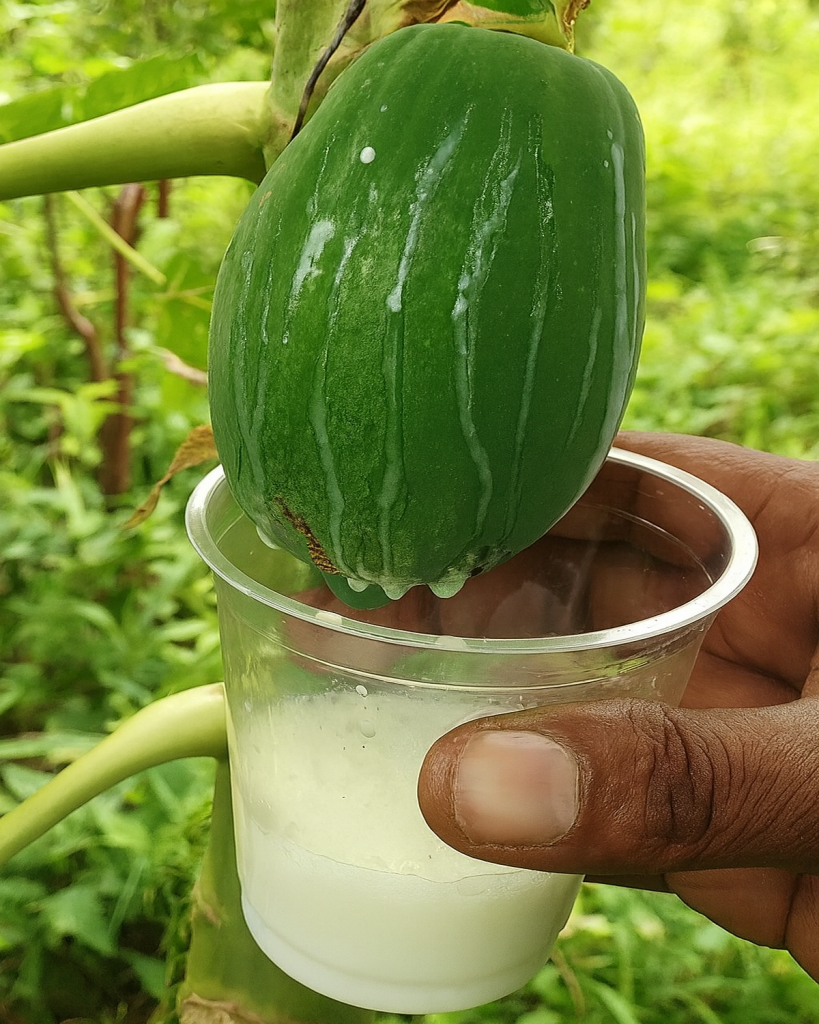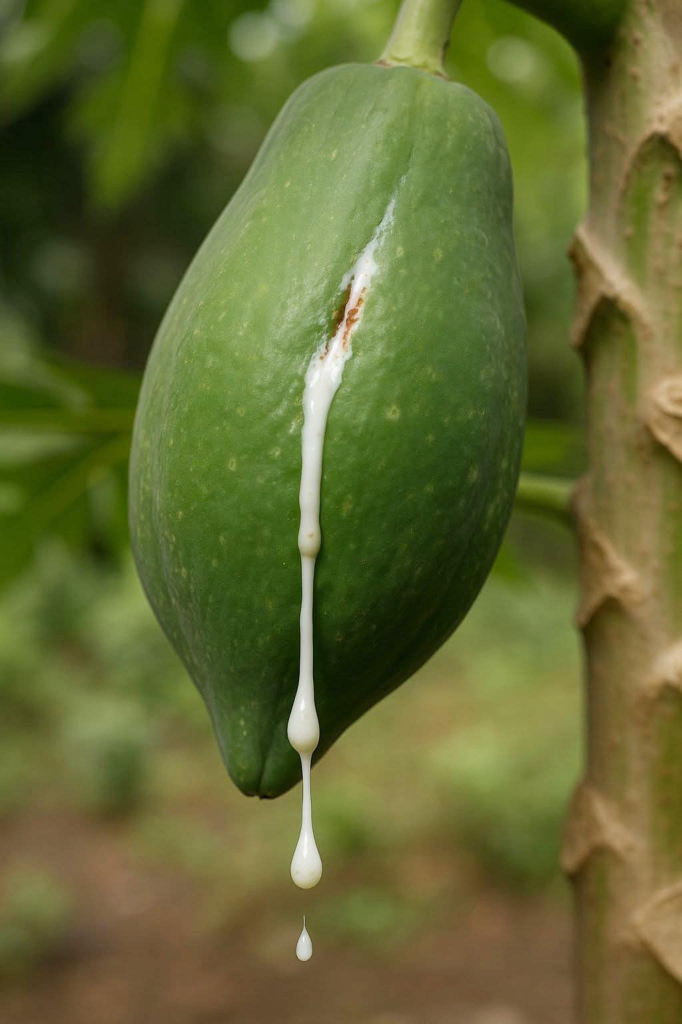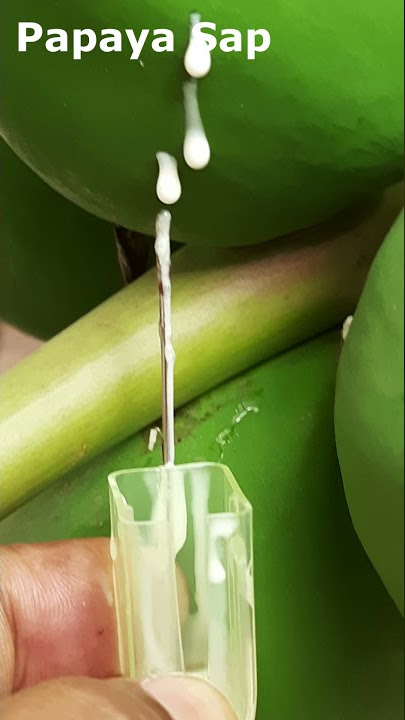Papaya is often celebrated as the “fruit of angels” thanks to its sweet taste and impressive nutrition profile. Millions of people enjoy it worldwide for its digestive benefits and high vitamin C content. But here’s something most people don’t know: the milky-white sap of papaya—sometimes overlooked or even discarded—holds remarkable medicinal potential. For centuries, traditional medicine systems in Asia, Africa, and South America have used papaya sap (also known as papaya latex) for healing wounds, easing digestion, and even protecting against infections.
Modern science is beginning to confirm what our ancestors already knew. Papaya sap is packed with powerful enzymes such as papain and chymopapain, along with antioxidants, alkaloids, and natural compounds that support the body inside and out. While it must be used carefully, when applied correctly, papaya sap can provide unique health benefits not found in the fruit itself. In this article, we’ll uncover why papaya sap deserves your attention, how it can be used, and what the latest research says about its role in natural wellness.

What Exactly Is Papaya Sap?
Papaya sap is a thick, milky liquid that oozes from the green skin, stems, or unripe fruit of the papaya tree (Carica papaya). Unlike the fruit pulp, the sap contains concentrated enzymes that are highly active biologically.
Key Components in Papaya Sap
- Papain: A proteolytic enzyme that breaks down proteins and supports digestion.
- Chymopapain: Another enzyme with anti-inflammatory properties, historically used for back pain.
- Carpaine: An alkaloid with antimicrobial and potential cardiovascular benefits.
- Flavonoids and phenols: Antioxidants that help fight oxidative stress.
These natural compounds explain why papaya sap has been used both topically (on the skin) and internally (in small, controlled doses) for traditional health practices.
1. Digestive Support and Enzyme Therapy
Papain, the main enzyme in papaya sap, has been widely studied for its ability to help break down proteins into smaller, more digestible components.

Benefits for digestion:
- Reduces bloating and indigestion.
- Helps people with low stomach acid digest proteins more effectively.
- May support individuals recovering from digestive illnesses.
Practical tip: Papaya enzyme supplements often contain papain extracted from papaya sap. While chewing raw sap directly is not recommended, enzyme tablets can safely provide similar benefits.
2. Wound Healing and Skin Care
Traditional healers have long applied papaya sap to cuts, burns, and insect bites. The enzymes gently clean wounds, while the antimicrobial compounds reduce the risk of infection.
Case story: In rural communities in the Philippines, papaya sap mixed with honey has been applied to small wounds for faster healing. Local healers believe its natural enzymes help prevent pus formation and support tissue regeneration.
Modern evidence: Studies show papain-based ointments may help remove dead tissue and accelerate wound recovery, making papaya sap a valuable resource for skin care and first aid.
3. Anti-Inflammatory and Pain Relief
Chymopapain, a compound found in papaya sap, was once used in medical injections for herniated discs to relieve severe back pain. While this practice is less common today due to modern alternatives, it highlights the anti-inflammatory power of papaya sap.

Other potential uses:
- Reducing swelling in minor injuries.
- Supporting natural joint comfort.
- Complementary remedy for arthritis when combined with diet and exercise.
4. Fighting Infections Naturally
The antimicrobial compounds in papaya sap make it a natural defense against bacteria, fungi, and even certain parasites.
Examples of traditional use:
- As a topical treatment for ringworm and fungal infections.
- Mixed with herbal teas to reduce intestinal worms (always under expert supervision).
- As a natural disinfectant for minor skin irritations.
Comparison Table: Papaya Fruit vs. Papaya Sap
| Feature | Papaya Fruit (Ripe) | Papaya Sap (Latex) |
|---|---|---|
| Taste | Sweet and refreshing | Bitter, pungent, not edible raw |
| Main Nutrients | Vitamin C, fiber, folate | Enzymes (papain, chymopapain), alkaloids |
| Common Uses | Eaten fresh, juices, salads | Wound healing, enzyme therapy, topical remedies |
| Safety Level | Safe for daily consumption | Must be used carefully, can irritate skin |
5. Supporting Liver and Detox Functions
Antioxidants in papaya sap help protect the liver from oxidative stress. Traditional herbalists have used diluted sap preparations to support liver detox and reduce symptoms of jaundice.
Modern perspective: While more research is needed, preliminary studies suggest that papain may reduce liver inflammation and assist in breaking down toxins.

Safety and Precautions
Papaya sap is powerful, which means it must be used with care.
- Do not consume raw sap directly: It can cause stomach irritation, nausea, or allergic reactions.
- Skin sensitivity: Always test on a small patch of skin first. Some people may develop rashes.
- Pregnancy warning: Papaya sap has historically been linked to uterine contractions and should be avoided by pregnant women.
- Medical supervision: If you’re considering papaya enzyme supplements for digestion or wound healing, consult a healthcare provider first.
Real-Life Experiences
- Mariana, 46, Brazil: “My grandmother used papaya sap for insect bites. I still apply a tiny amount diluted in coconut oil for quick relief from itching.”
- James, 54, USA: “I take papain supplements after heavy meals. They really help reduce bloating and discomfort.”
- Ravi, 60, India: “We always used papaya sap on small cuts growing up. It worked like a natural antiseptic.”
Conclusion
Papaya is loved for its fruit, but the sap is its hidden treasure—rich in enzymes and healing compounds. Used carefully, papaya sap may help improve digestion, speed wound healing, reduce inflammation, and support natural detox processes. While it should never replace professional care, its centuries-old role in traditional medicine and growing scientific recognition prove that this unpretentious milky liquid is more valuable than most people realize.
Frequently Asked Questions
Can I apply papaya sap directly to my skin?
Yes, but always dilute and test first to avoid irritation.
Is it safe to drink papaya sap?
Not raw. Only processed or supplement forms are safe under guidance.
Can papaya sap cure serious illnesses?
No. It may support wellness but should not replace prescribed treatments.
How does it differ from eating papaya fruit?
The fruit nourishes with vitamins and fiber, while the sap offers concentrated enzymes and medicinal compounds.
This article is for informational purposes only and does not replace professional medical advice.




